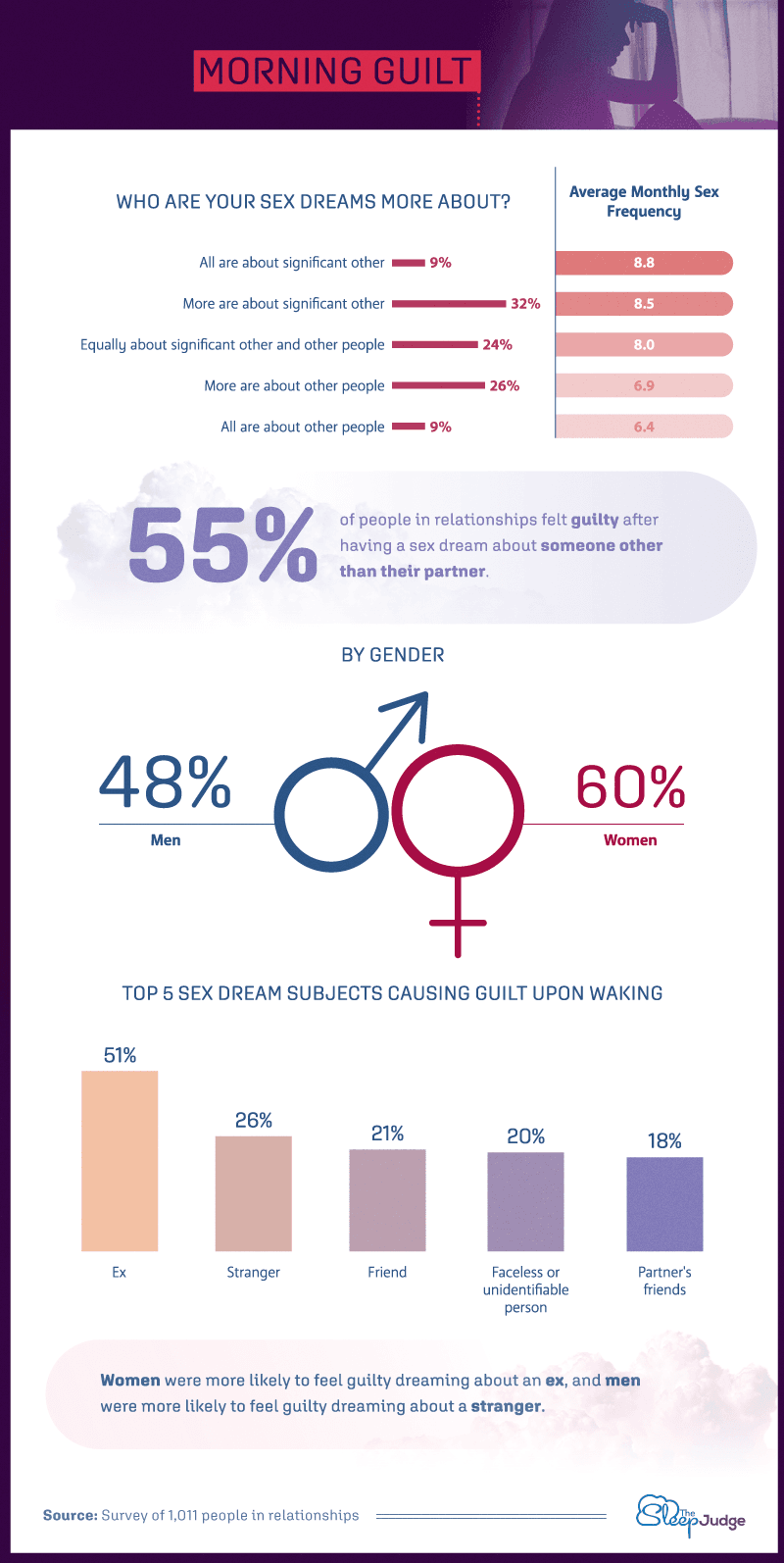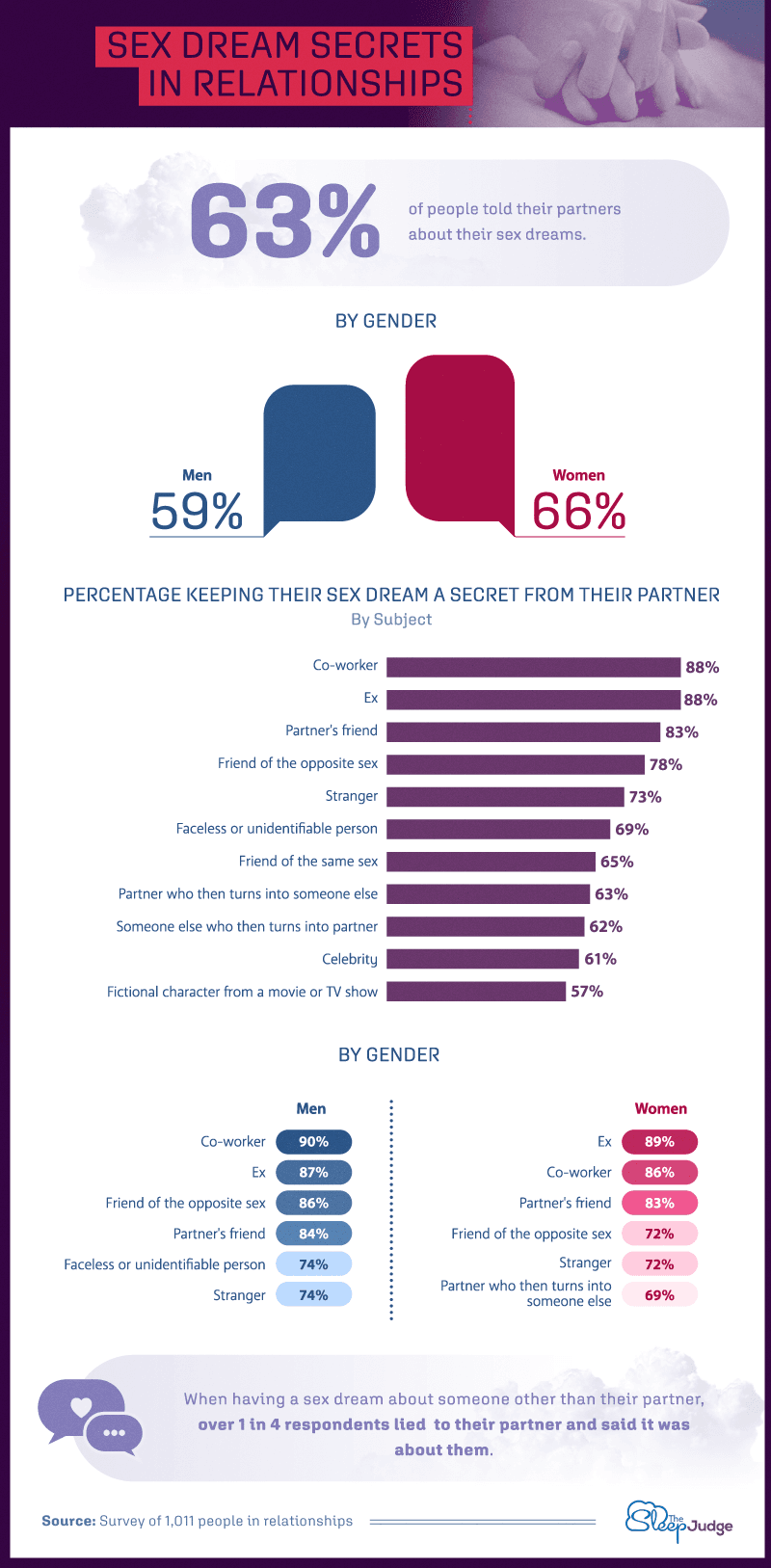Sometimes, it’s easier to tell strangers our deepest secrets than our closest friends. This became even more evident when we surveyed 1,011 people in relationships and asked them about the details of their sex dreams. Respondents readily divulged people, places, and performances – the very same details they also admitted they were unwilling to share with their romantic partners.
Who is dreaming about whom in sexual scenarios? And what exactly happens in these dreams? How deep does the secrecy go? If you’ve ever wondered about the answers to these questions, you’ll want to keep reading.
Face of the Fantasy
We’ll start by saying that couples can generally rest easy next to their partners, as most often they dreamed about sex with each other. But there were a few things that might be of particular concern.
It was more common for women to dream of their partner, while men were twice as likely to have sex dreams about their co-workers. We mention this because 53.5% of men’s extramarital or relationship affairs are with people they know well, “such as a neighbor, co-worker, or long-term acquaintance.” Men were also twice as likely to dream sexually about their significant other’s friends, but many of their partners likely did the same thing! Actually, women did it even more: They were over three times as likely to dream sexually about their female friends.
Regardless of the object of desire, sex dreams were quite common. Twenty-nine percent of those in relationships and 23 percent of married respondents had a sex dream at least once every week.
Filling in the Fantasy Details
Respondents spoke very highly of their sex dreams: 69% said they involved “amazing sex,” and half dreamed of receiving oral sex. Eighteen percent dreamed of orgies or group sex, but for 44%, at least some dreams were just average.
The more a respondent had sex in real life, the more likely they were to dream about Bondage/Discipline Domination/Submission Sadism/Masochism, or BDSM. Group sex or orgies were also common dream scenarios for more sexually active participants. Those who were more experienced in bed seemed to have kinkier dreams and, perhaps, kinkier realities.
Fear also played an interesting role in sex dreams. The third most common scenario was having sex somewhere they didn’t want to get caught. The fear of getting caught is one of the most common sexual fantasies and is evidently played out in dreams. Women were actually more likely to dream about this, while men more often reported dreaming about performing poorly in bed.
Morning After

Guilt, an emotion known to impact a person’s self-worth, was all too common among our participants once dreams of people outside the relationship occurred. Sixty percent of women felt guilty after they had a sex dream about someone other than their partner. While only 48% of men felt the same, they were more likely to feel it when the dream was about a stranger. An ex being in the dream made all participants feel the most guilty, however.
Sex Dream Secrets

Nevertheless, co-workers and exes were once again bigger issues. Partners were the least likely to be honest with each other if a co-worker or an ex had been part of their sex dream. Perhaps these dreams have more of a bearing on reality than people wanted to admit.
Sharing sex dreams with a partner didn’t always have the air of a confessional, however. Nearly 30% of the time, people shared the juicy details of their sex dreams with their partners as a turn-on. Partners seemed to want more than just the details of another’s dream, though. In fact, 23% of women and 20% men had tried to induce a sexual dream. Experts recommend trying boosting melatonin levels by sleeping in complete darkness and taking some time to relax or meditate before hitting the hay.
Dream On
People say there’s no truth to dreams, but this data has us thinking otherwise. Respondents were least likely to be honest about dreams that correlated with the most realistic scenarios. And people who dreamed about sex more often were also the ones having the most sex in real life! So, dream on and dream well.
It’s a little difficult to dream, however, if you can’t even get to sleep, so let’s start there. As the premier sleep experts, The Sleep Judge’s one and only goal is to help you get better sleep! The Sleep Judge can help you find the tools, whether that’s finding the right mattress, the best pillows, or even just knowing where to look. Head to The Sleep Judge today to start sleeping and then dreaming.
Methodology and Limitations
We surveyed 1,011 people in relationships who had at least one sex dream while in their relationship. For respondents to be included in our data, they were required to meet the qualifications, complete the entire survey, take the survey only once without multiple attempts, and pass an attention-check question in the middle of each survey. Participants who failed to do all of these were excluded from the study.
Of all respondents, 54% were women; 45% were men; and less than 1% identified with a nonbinary gender. The average age of respondents was 38 with a standard deviation of 11 years.
The data we are presenting rely on self-reporting. There are inherent issues with self-reported data. These issues include, but are not limited to, selective memory, telescoping, attribution, and exaggeration. In finding averages of quantitative values, we removed outliers so that data were not exaggerated.
Fair Use Statement
There’s no need for guilt or embarrassment about the sex dreams you and many others are having. Feel free to share our data to show just how normal this behavior really is. That said, the sharing must be for noncommercial purposes and you must link back to this page to provide proper attribution.



